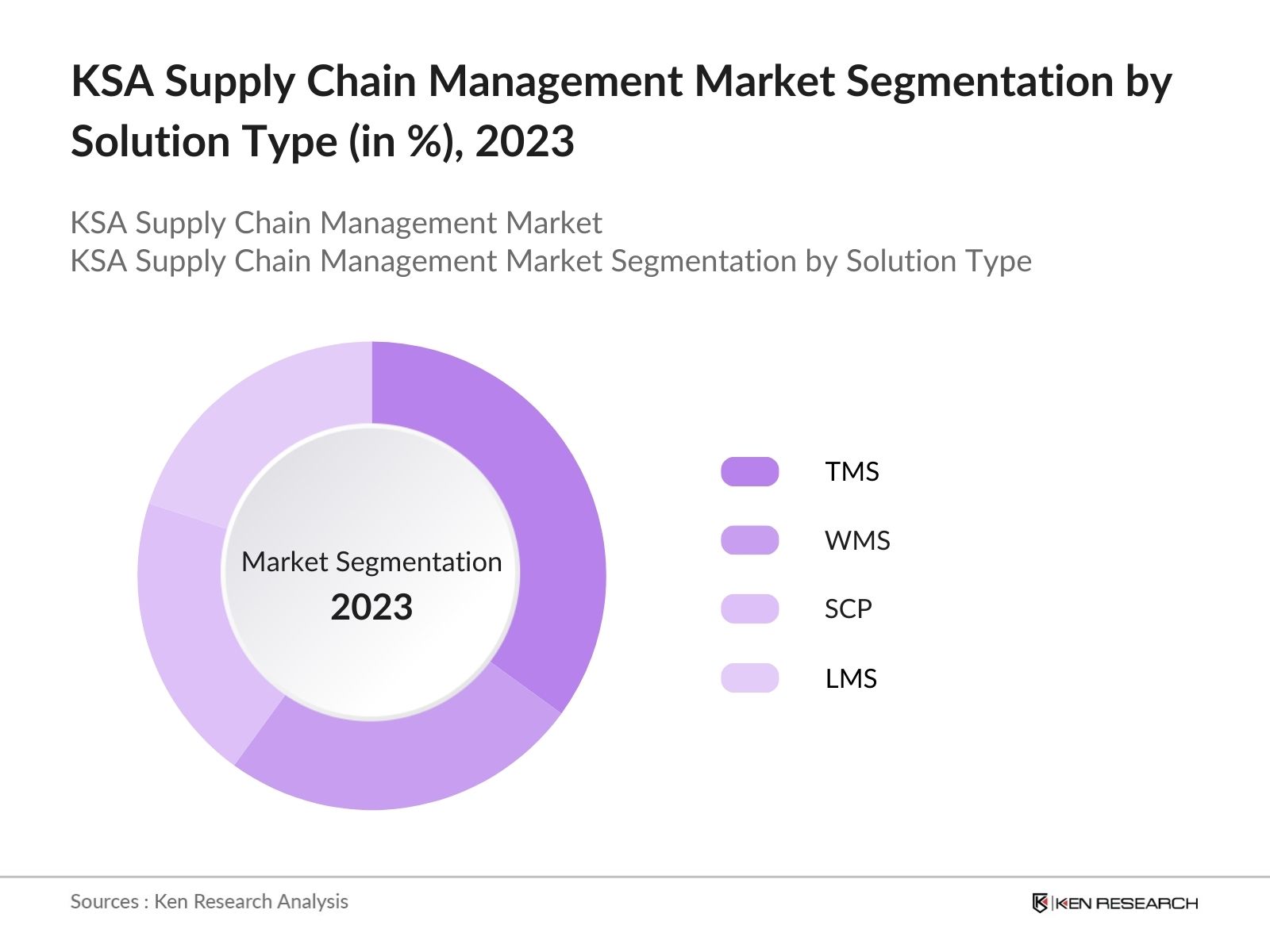
KSA Supply Chain Management Market Outlook to 2030
Region:Middle East
Author(s):Shreya Garg
Product Code:KROD694
August 2024
100
About the Report
KSA Supply Chain Management Market Overview
- The KSA Supply Chain Management (SCM) market has experienced significant growth over the past few years. In 2018, the market size was valued at USD 2.5 billion. By 2023, it expanded to USD 4.8 billion, reflecting a Compound Annual Growth Rate (CAGR) of 13.6%. This growth is driven by several factors, including increased demand for efficient logistics solutions.
- Key players in the KSA SCM market include industry giants like SAP SE, Oracle Corporation, JDA Software Group, Inc., Infor, and Manhattan Associates. These companies dominate the market by providing comprehensive SCM solutions that encompass logistics, warehouse management, transportation management, and supply chain planning.
- In 2023, Oracle Corporation announced the opening of a new cloud region in Riyadh, KSA. This development is significant as it aims to enhance digital transformation in the region by offering robust cloud services, including advanced SCM solutions. This initiative is expected to bolster the market by providing scalable and secure SCM services to businesses across various sectors in KSA.
- Jubail, the key city in the Eastern Province, hosts one of the largest industrial cities in the world, further enhancing its logistical capabilities. In 2023, the Eastern Province accounted for a major part in the SCM market share in KSA, driven by its extensive logistics network and proximity to major industrial zones.
KSA Supply Chain Management Market Segmentation
The KSA Supply Chain Management Market can be segmented by various factors like solution type, deployment type, and region.
By Solution Type: KSA Supply Chain Management Market is segmented by solution type into transportation management systems, warehouse management systems, supply chain planning and logistics management systems. In 2023, Transportation Management Systems (TMS) held a dominant market share. This dominance is attributed to the increasing need for efficient transportation solutions to manage complex logistics networks.

By Deployment Mode: KSA Supply Chain Management Market is segmented by deployment mode into on-premise, cloud-based and hybrid. On-premise deployment mode dominated the KSA SCM market in 2023. This preference is driven by the high level of control and customization that on-premise solutions offer.

By Region: KSA Supply Chain Management Market is segmented by region into north, south, east and west KSA. The Eastern region dominated the KSA SCM market in 2023. The region's dominance is primarily due to its strategic location and well-developed infrastructure, including major ports and industrial zones.
KSA Supply Chain Management Market Competitive Landscape
|
Company Name |
Establishment Year |
Headquarters |
|
SAP SE |
1972 |
Walldorf, Germany |
|
Oracle Corporation |
1977 |
Austin, Texas, USA |
|
JDA Software Group |
1985 |
Scottsdale, Arizona, USA |
|
Infor |
2002 |
New York, USA |
|
Manhattan Associates |
1990 |
Atlanta, Georgia, USA |
- SAP SE's Partnership with Saudi Logistics Hub: SAP is increasing its investment in Saudi Arabia by establishing an SAP Innovation Hub and SAP Experience Center, extending the Academy of Engineering program with the Ministry of Communications and Information Technology, and participating in the LEAP 2024 tech event. This is expected to drive digital transformation in the logistics sector and support the growth of the SCM market in KSA.
- Infor's AI-Powered SCM Platform Launch: Infor launched its AI-powered SCM platform which led to a rush in the latest techniques in KSA as well. It is designed to optimize supply chain processes and improve decision-making capabilities. The platform includes features such as predictive analytics, demand forecasting, and inventory optimization, providing businesses with advanced tools to enhance their supply chain operations.
KSA Supply Chain Management Industry Analysis
KSA Supply Chain Management Market Growth Drivers
- Increased Investment in Infrastructure: Saudi Arabia has announced a trillion-dollar pipeline of infrastructure projects aimed at diversifying the economy beyond oil and positioning itself as a global hub for investment and logistics in line with its Vision 2030. This substantial investment aims to enhance the efficiency of supply chain operations and reduce transportation costs, thus driving the growth of the SCM market in KSA.
- Strategic Geographical Location: Saudi Arabia's strategic geographic location connecting Asia, Europe, and Africa as a key advantage in its ambition to become a leading global logistics center. There is a plan for development of 59 logistics centers across the country by 2030, with a total area exceeding 1 billion square feet. This is seen as opportunity for enabling efficient supply chain operations and attracting multinational companies.
- Adoption of Advanced Technologies: The integration of advanced technologies such as AI, IoT, and blockchain is transforming the SCM landscape in KSA. In 2024, the adoption rate of AI-powered SCM solutions among large enterprises reached 65,000 units. This technological advancement enables businesses to achieve higher operational efficiency and cost savings.
KSA Supply Chain Management Market Challenges
- High Initial Investment Costs: Supply chain organizations invest in AI and advanced analytics applications, indicating widespread adoption across companies of various sizes. However, the implementation of advanced SCM solutions requires significant initial investments, which can be a barrier for many businesses, especially SMEs, this high cost limits the ability of smaller firms to adopt these technologies.
- Skilled Labor Shortage: Middle East, including the role of the kafala sponsorship system and the substantial reliance on expatriate workers in Gulf Cooperation Council (GCC) states like the UAE and Qatar, where migrant workers account for over 90% of the workforce. Therefore, the shortage of skilled labor in the SCM sector is a pressing issue in KSA, thus creating a gap between demand and supply of qualified personnel.
KSA Supply Chain Management Market Government Initiatives
- National Industrial Development and Logistics Program (NIDLP): In October 2022, the General Authority of Civil Aviation (GACA) launched the Integrated Logistics Bonded Zone (ILBZ), a special economic zone located adjacent to the King Khalid International Airport in Riyadh. It also offers various customs and tax incentives to attract businesses. Hence, designed to boost Saudi Arabia's cargo capacity, bolster supply chains, and position the country as a global logistics hub
- Customs Reforms: Saudi Arabia changed its customs tariff rates on various product categories, reducing them to 0-5% or 5-12% in many cases. The Saudi government has been making efforts to reform its customs regime. These reforms enhance investments in infrastructure projects, technological advancements, and the development of logistics capabilities. Thus making easy for businesses in KSA to attract more companies to invest in the SCM market.
KSA Supply Chain Management Market Future Outlook
Looking forward to 2028, the KSA SCM market is projected to grow exponentially. The market's future growth will be driven by continued investments in infrastructure, adoption of artificial intelligence and machine learning in SCM processes, and the increasing importance of sustainable and resilient supply chains.
Future Trends
- Growth of E-commerce Driving SCM Demand: Over the next five years, the growth of e-commerce in KSA is expected to significantly drive the demand for efficient SCM solutions. By 2028, the e-commerce market in KSA is projected to reach USD 15 billion, necessitating advanced logistics and supply chain capabilities to handle increased order volumes and ensure timely deliveries.
- Shift Towards Sustainable Supply Chains: Sustainability is expected to become a key focus in the SCM market over the next five years. By 2028, it is projected that more than 5000 companies in KSA will adopt sustainable supply chain practices, driven by regulatory requirements and consumer demand for environmentally responsible products. This shift will involve the implementation of green logistics solutions, reducing carbon emissions, and promoting eco-friendly supply chain operations
Scope of the Report
Â
|
By Solution Type |
Transportation Management Systems Warehouse Management Systems Supply Chain Planning Logistics Management Systems |
|
By Deployment Type |
On-Premise Cloud-Based Hybrid |
|
By Region |
North South East West |
Products
Key Target Audience – Organizations and Entities who can benefit by Subscribing this Report:
Large Enterprises
SMEs (Small and Medium Enterprises)
Logistics Companies
Retail Chains
Transportation Companies
Warehouse Operators
Government Agencies (e.g., Saudi Logistics Hub)
Investors and VC Firms
Time Period Captured in the Report:
Historical Period: 2018-2023
Base Year: 2023
Forecast Period: 2023-2028
Companies
Players Mentioned in the Report:Â
SAP SE
Oracle Corporation
JDA Software Group, Inc.
Infor
Manhattan Associates
IBM Corporation
Blue Yonder Group, Inc.
Kinaxis Inc.
Epicor Software Corporation
Descartes Systems Group Inc.
HighJump Software Inc.
Coupa Software Inc.
Logility, Inc.
E2open, LLC
Dassault Systèmes SE
Table of Contents
1. KSA Supply Chain Management Market Overview
1.1 KSA Supply Chain Management Market Taxonomy
2. KSA Supply Chain Management Market Size (in USD Mn), 2018-2023
3. KSA Supply Chain Management Market Analysis
3.1 KSA Supply Chain Management Market Growth Drivers
3.2 KSA Supply Chain Management Market Challenges and Issues
3.3 KSA Supply Chain Management Market Trends and Development
3.4 KSA Supply Chain Management Market Government Regulation
3.5 KSA Supply Chain Management Market SWOT Analysis
3.6 KSA Supply Chain Management Market Stake Ecosystem
3.7 KSA Supply Chain Management Market Competition Ecosystem
4. KSA Supply Chain Management Market Segmentation, 2023
4.1 KSA Supply Chain Management Market Segmentation by Solution Type (in value %), 2023
4.2 KSA Supply Chain Management Market Segmentation by Deployment Type (in value %), 2023
4.3 KSA Supply Chain Management Market Segmentation by Region (in value %), 2023
5. KSA Supply Chain Management Market Competition Benchmarking
5.1 KSA Supply Chain Management Market Cross-Comparison (no. of employees, company overview, business strategy, USP, recent development, operational parameters, financial parameters and advanced analytics)
6. KSA Supply Chain Management Future Market Size (in USD Mn), 2023-2028
7. KSA Supply Chain Management Future Market Segmentation, 2028
7.1 KSA Supply Chain Management Market Segmentation by Solution Type (in value %), 2028
7.2 KSA Supply Chain Management Market Segmentation by Deployment Type (in value %), 2028
7.3 KSA Supply Chain Management Market Segmentation by Region (in value %), 2028
8. KSA Supply Chain Management Market Analysts’ Recommendations
8.1 KSA Supply Chain Management Market TAM/SAM/SOM Analysis
8.2 KSA Supply Chain Management Market Customer Cohort Analysis
8.3 KSA Supply Chain Management Market Marketing Initiatives
8.4 KSA Supply Chain Management Market White Space Opportunity Analysis
Disclaimer Contact UsResearch Methodology
Step 1: Identifying Key Variables
Ecosystem creation for all the major entities and referring to multiple secondary and proprietary databases to perform desk research around market to collate industry level information.Â
Step 2: Market Building
Collating statistics on KSA Supply Chain Management Market over the years, penetration of marketplaces and service providers ratio to compute revenue generated for KSA Supply Chain Management Market. We will also review service quality statistics to understand revenue generated which can ensure accuracy behind the data points shared.Â
Step 3: Validating and Finalizing
Building market hypothesis and conducting CATIs with industry experts belonging to different companies to validate statistics and seek operational and financial information from company representatives.Â
Step 4: Research Output
Our team will approach multiple supply management service companies and understand nature of product segments and sales, consumer preference and other parameters, which will support us validate statistics derived through bottom to top approach from supply management service industry.
Frequently Asked Questions
01 How big is the KSA Supply Chain Management Market?
In 2023, the KSA Supply Chain Management (SCM) market was valued at USD 4.8 billion. This market size reflects significant growth from 2018, driven by advancements in technology, increased investments in infrastructure, and the country's strategic geographical location as a logistics hub.
02 What are the growth drivers of the KSA Supply Chain Management Market?
Key growth drivers in the KSA Supply Chain Management Market include substantial government investment in logistics infrastructure, the adoption of advanced technologies such as AI and blockchain, KSA's strategic geographical position, and strong governmental support for SMEs involved in supply chain operations.
03 What are challenges faced by the KSA Supply Chain Management Market?
Challenges in the KSA Supply Chain Management include high initial investment costs for advanced SCM solutions, a complex regulatory environment, a shortage of skilled labor in the SCM sector, and potential disruptions due to geopolitical factors in the region.
04 Who are the major players in the KSA Supply Chain Management Market?
Major players in the KSA Global SCM market include SAP SE, Oracle Corporation, JDA Software Group, Infor, and Manhattan Associates. These companies lead the market by providing comprehensive SCM solutions and continuously innovating to meet industry demands.
Why Buy From Us?

What makes us stand out is that our consultants follows Robust, Refine and Result (RRR) methodology. i.e. Robust for clear definitions, approaches and sanity checking, Refine for differentiating respondents facts and opinions and Result for presenting data with story

We have set a benchmark in the industry by offering our clients with syndicated and customized market research reports featuring coverage of entire market as well as meticulous research and analyst insights.

While we don't replace traditional research, we flip the method upside down. Our dual approach of Top Bottom & Bottom Top ensures quality deliverable by not just verifying company fundamentals but also looking at the sector and macroeconomic factors.

With one step in the future, our research team constantly tries to show you the bigger picture. We help with some of the tough questions you may encounter along the way: How is the industry positioned? Best marketing channel? KPI's of competitors? By aligning every element, we help maximize success.

Our report gives you instant access to the answers and sources that other companies might choose to hide. We elaborate each steps of research methodology we have used and showcase you the sample size to earn your trust.

If you need any support, we are here! We pride ourselves on universe strength, data quality, and quick, friendly, and professional service.
















